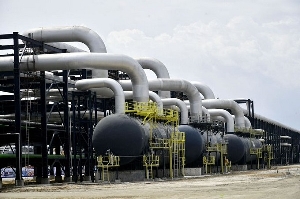LAGOS, Nigeria — Nigeria’s Dangote refinery, a $20 billion facility with a capacity of 650,000 barrels per day, is conducting test runs for gasoline production and is expected to be fully operational by mid-September, according to industry monitor IIR Energy.
The refinery, built by Africa’s richest man, Aliko Dangote, on the outskirts of Lagos, began operations in January after several years of delays. To date, it has only produced diesel and other distillate fuels.

Dangote had previously announced that gasoline deliveries from the refinery would start in July, revising an earlier target of May for the commencement of motor fuel production. IIR Energy noted in a client communication that further extensions to this timeline are possible.
The massive refinery project represents a significant development for Nigeria’s oil industry and the broader African energy sector. Once fully operational, it is expected to dramatically alter the Europe-to-Africa fuel trade dynamics and reduce Nigeria’s dependence on imported refined petroleum products.
Nigeria, despite being Africa’s largest oil producer, has long relied heavily on imported fuels due to the poor state of its existing refineries. The Dangote refinery’s entry into gasoline production could potentially alleviate fuel shortages that have plagued the country and ease pressure on foreign exchange reserves used for fuel imports.
The refinery’s progress is being closely watched by industry analysts and stakeholders across the continent. Its success could serve as a model for other African nations seeking to boost their refining capabilities and reduce reliance on imported fuels.

However, the project has faced numerous challenges, including funding issues, logistical hurdles, and delays exacerbated by the global COVID-19 pandemic. The repeated postponements of gasoline production have raised questions about the complexities involved in bringing such a large-scale refinery to full operational status.
The refinery’s impact extends beyond Nigeria’s borders. Its high production capacity has the potential to transform the West African sub-region into a net exporter of refined petroleum products, a significant shift from its current import-dependent status.
As the mid-September target for full operations approaches, eyes will be on the Dangote refinery to see if it can meet this latest deadline and begin to deliver on its promise of transforming Nigeria’s energy landscape.
Attempts to reach Dangote representatives for comment were unsuccessful, with emails undelivered and phone calls unable to connect.
The refinery’s progress comes at a critical time for Nigeria’s economy, which has been grappling with currency devaluation, high inflation, and the need for economic diversification. The success of the Dangote refinery could provide a much-needed boost to the country’s industrial sector and potentially serve as a catalyst for further investments in the Nigerian economy.
Reuters


